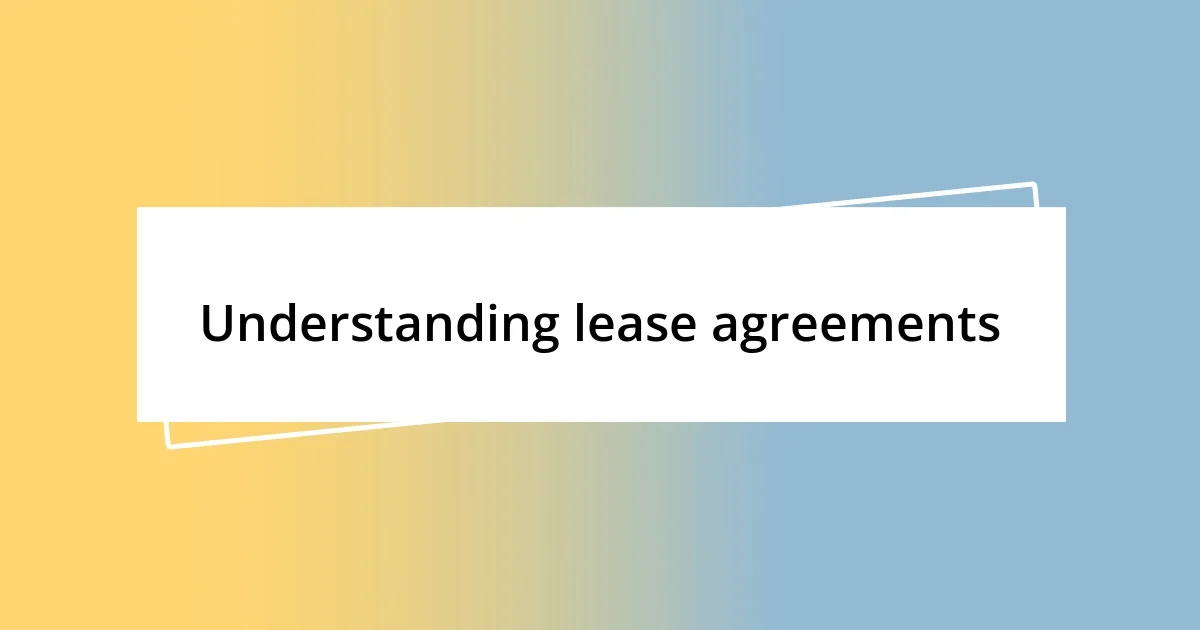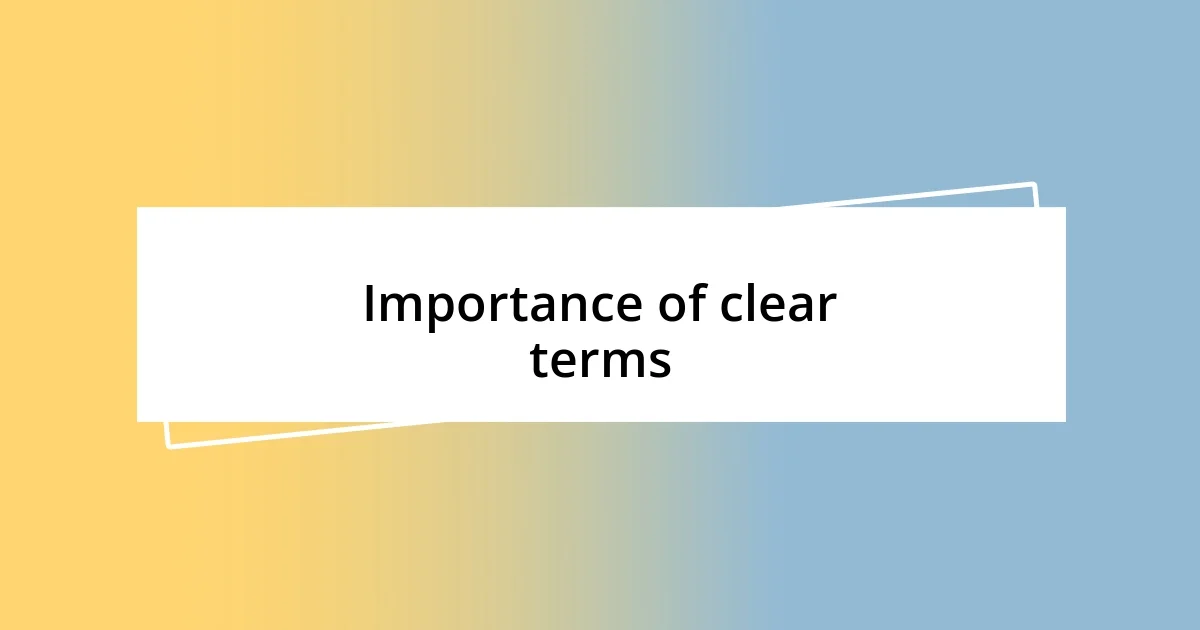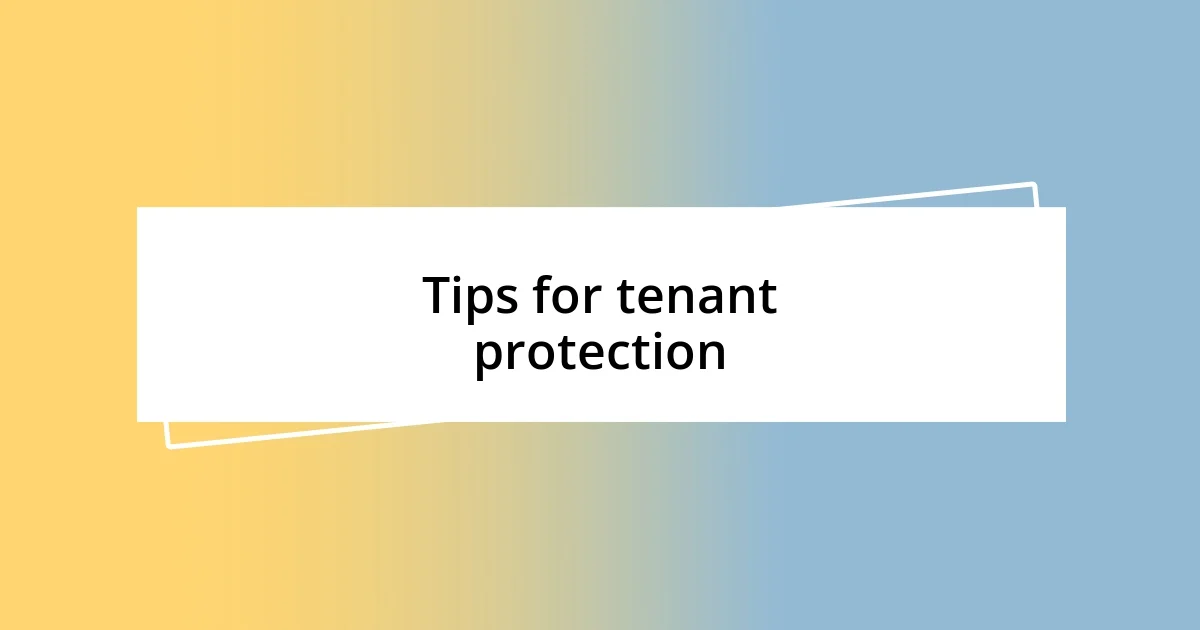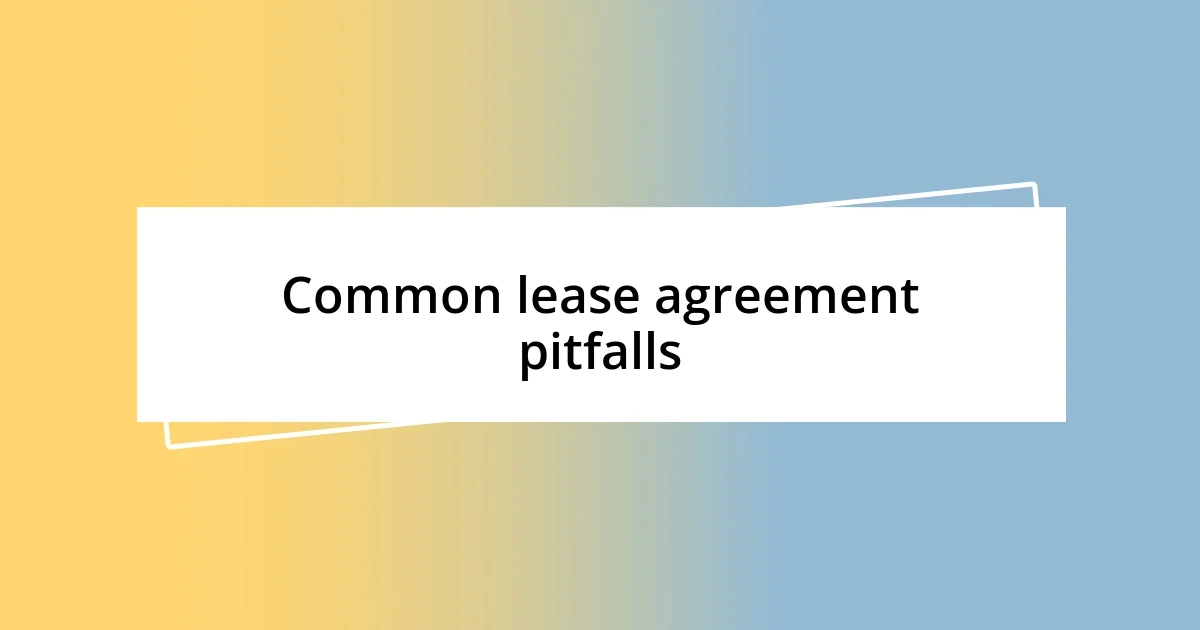Key takeaways:
- Lease agreements are essential documents that define the rights and responsibilities of landlords and tenants, making clarity and communication crucial to avoid misunderstandings.
- Including key components such as rent amount, maintenance responsibilities, and termination terms in lease agreements is vital to ensure a smooth renting experience.
- Best practices for enforcement include establishing clear processes for addressing violations, keeping detailed records, and regularly reviewing lease terms to adapt to changes.

Understanding lease agreements
Lease agreements are more than just pieces of paper; they’re essential contracts that outline the rights and responsibilities of both landlords and tenants. I remember the first time I signed a lease — the excitement mixed with a bit of anxiety. Did I really understand everything in that document? It’s crucial to read every line carefully, as every clause can significantly impact your living situation.
At their core, lease agreements establish the terms of how long you will reside in a property, the rent amount, and the rules you’ll need to follow. I often advise my friends to think of it like a relationship — clear communication is key. If something doesn’t make sense, don’t hesitate to ask questions! This proactive approach can prevent misunderstandings down the road.
One important aspect I always emphasize is the varying lengths of lease terms. Short-term leases offer flexibility. However, a long-term agreement can provide stability. Which one feels right for your lifestyle? Personally, I tend to prefer longer commitments because they create a sense of belonging, but that’s not the case for everyone. Understanding these nuances can help you choose the right lease for your needs.

Importance of clear terms
Clear terms in lease agreements serve as a foundation for any landlord-tenant relationship. I can recall a friend of mine who overlooked a clause about maintenance responsibilities in her lease. This mistake led to frustration when repairs were needed, and she soon found out she was liable. By ensuring that terms are explicitly stated, both parties can avoid unnecessary disagreements and work together more harmoniously.
When I first rented an apartment, I was thrilled until I discovered vague wording around the rules regarding pets. As a dog lover, I felt an immediate sense of dread, fearing I might be violating the lease unknowingly. Precise terms, like pet policies, create an environment of trust and security. They help tenants feel comfortable knowing that their lives won’t be disrupted by unexpected changes.
Furthermore, I’ve learned that clear terms can significantly ease the stress when moving out. I distinctly remember the anxiety I felt while preparing to vacate my first rental. The lease wasn’t crystal clear on how the security deposit would be handled, and I worried about disputes. Having lease terms that clearly outline procedures for returning deposits or conducting inspections can make this transition smoother for all involved.
| Clarity | Ambiguity |
|---|---|
| Prevents misunderstandings | Leads to disputes |
| Establishes trust | Creates anxiety |
| Facilitates smooth transitions | Causes complications |

Key components to include
Ensuring you include key components in your lease agreement is vital for a successful rental experience. One time, I understood just how crucial it is to list all included and excluded items after a roommate’s misunderstanding about furniture. We had agreed on a furnished place, but the specifics about the couch were murky. Without clear listings, we risked conflict over ownership and expectations.
Here are essential components to ensure are covered in your lease:
- Basic Information: Names of tenants and landlord, property address.
- Term of Lease: Start and end dates, renewal options.
- Rent Amount: Payment schedule, accepted payment methods, late fees.
- Security Deposit: Amount, conditions for return, and potential deductions.
- Maintenance Responsibilities: Who handles repairs and how requests should be made?
- Rules and Regulations: Policies on pets, noise, and changes to the property.
- Termination Terms: How either party can end the lease, notice period required.
- Utilities: Clarity on which bills are covered by the tenant versus the landlord.
Last year, I learned firsthand the importance of specifying who handles routine maintenance. After a leaky faucet incident, I found myself wading through frustration because it wasn’t clearly outlined in the lease. Being proactive about these specifics can save a lot of heartache and create a smoother living experience.

Negotiation strategies for landlords
When it comes to negotiating lease agreements, I believe establishing a personal connection with potential tenants is crucial. In my experience, I’ve found that a friendly conversation can break down barriers that might make negotiations feel stiff or uncomfortable. For instance, during my last leasing negotiation, I shared my own excitement about living in the neighborhood, which helped the tenant feel more at ease and opened the door for candid discussions about their needs and expectations.
Another strategy I employ is to be flexible when discussing terms. I remember a time when a prospective tenant expressed concern over the security deposit. Instead of digging my heels in, I proposed breaking it into smaller payments over the first few months. This small concession not only satisfied the tenant but also strengthened our relationship from the outset. Isn’t it remarkable how a little flexibility can yield a positive reaction?
Lastly, I find that being transparent about my intentions goes a long way. I once had a tenant who was hesitant about my policy on pets. Instead of simply stating the rules, I shared my perspective on how I value responsible pet ownership and its impact on the community. Framing it this way turned a potentially confrontational topic into a collaborative discussion. It’s moments like these that remind me how communication can pave the way for successful negotiations and positive landlord-tenant relationships.

Tips for tenant protection
Protecting tenants starts with understanding their rights. I remember when my friend moved into a new apartment and felt unsure of what to expect regarding repairs. It’s essential to explain not just what the lease includes but also what protections tenants have under local laws. When they know their rights, they can stand up for themselves if issues arise.
Another tip is to encourage open communication. I can’t stress enough how important it is for tenants to feel comfortable reaching out about concerns. During my own renting journey, I often faced minor issues that snowballed into bigger problems simply because I hesitated to speak up. A clear line of communication with the landlord makes it easier to resolve issues swiftly, leading to a more harmonious living arrangement.
Finally, consider recommending tenants take photos of the property before moving in. The first time a roommate and I neglected to do this, we found ourselves in a dispute over a scratched floor when moving out. By documenting the condition of the space, tenants can protect themselves from unfair charges later. Doesn’t it make sense to gather evidence upfront to avoid headaches down the road?

Common lease agreement pitfalls
When we dive into the common pitfalls of lease agreements, one that stands out is the vague language often used in these documents. I recall a friend who signed a lease without fully understanding the section regarding notice periods. It turned out that “reasonable notice” meant a month for the landlord, but only two weeks for her—a frustrating discrepancy that caught her off guard. Vague terms can lead to misunderstandings, so clarity is vital.
Another issue I frequently notice is the failure to document important verbal agreements. For instance, I once agreed with a landlord that I could paint my apartment, but this understanding never made it into the lease. When it came time to move out, they cited the “no modifications” clause, which left me feeling powerless. I learned the hard way that if it’s not on paper, it might as well not exist in their eyes. Have you ever faced a similar situation? It’s a wake-up call on the importance of detailed documentation.
Finally, neglecting to review local laws and regulations can create significant problems. I remember chatting with a fellow landlord who didn’t realize his lease terms conflicted with tenant rights in his area. When issues arose, he found himself on the wrong end of a not-so-friendly visit from a local tenant rights group. This experience underscored for me that knowing the local laws isn’t just a good idea—it’s essential for protecting both parties involved. The nuances of the law can easily trip you up if you’re not careful, don’t you think?

Best practices for enforcement
One of the best practices for enforcement is to establish a clear and fair process for addressing violations. I once encountered a situation where my landlord had a specific protocol for handling late rent payments, which made the situation much less stressful for both of us. Knowing that there was a structured way to communicate problems helped us resolve issues calmly, rather than letting tensions rise under uncertainty. How often do you think a transparent system could prevent misunderstandings?
Another essential strategy is to keep detailed records of all communications and agreements. For me, this became apparent when I had to refer back to past conversations with my landlord over a maintenance issue. Having everything documented not only supported my claims but also facilitated quicker resolutions. Don’t you think that a little organization can go a long way in keeping the peace?
Regular reviews of the lease terms can also be beneficial. I learned this lesson the hard way when I had a friend who neglected to revisit their lease after a year. They were surprised to find that some provisions had changed, which had significant implications for their living situation. A periodic check-in ensures that both tenants and landlords stay on the same page and can adapt to any shifts that might occur. Who wouldn’t want to keep their lease relevant and fair?














